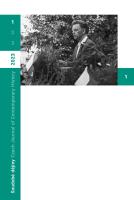Protahování předem prohrané partie
Extending an Already Lost Game
Ministry of Foreign Affaris in Liquidation (1939–1941)
Author(s): Daniel PutíkSubject(s): History, Diplomatic history, Political history, WW II and following years (1940 - 1949), Fascism, Nazism and WW II
Published by: AV ČR - Akademie věd České republiky - Ústav pro soudobé dějiny
Keywords: Czechoslovakia;Protectorate of Bohemia and Moravia;Czechoslovak Ministry of Foreign Affairs (in Liquidation);Czechoslovak foreign policy;diplomacy;German occupation;Robert Flieder;Václav Rejholec
Summary/Abstract: The article focuses on the process of the liquidation of the Czechoslovak Foreign Service after the German occupation (15 March 1939) from the perspective of the Ministry of Foreign Affairs in Liquidation (Ministerstvo zahraničních věcí v likvidaci), which carried out its remaining agenda under the supervision of representatives ofthe Reich Foreign Office (Auswärtiges Amt). The author focuses on the functioning of the liquidated ministry as a part of the Protectorate administration, on the personnel and financial aspects of the liquidation process, and on its culmination in the final dissolution of the ministry in January 1941, when only about three percent of the original staff from before the German occupation remained in its Prague headquarters. Using the case of Czechoslovak diplomats who refused to sign a pledge of obedience to Adolf Hitler and return to their homeland from embassies abroad, he reconstructs the involvement of both the Czech and German bureaucracies in repressive measures, which included the stripping of these persons of their Protectorate citizenship. Particular attention is paid to the agency of the lawyer Robert Flieder (1883–1957) and experienced diplomat Václav Rejholec (1886–1967), who took over the leadership of the Ministry of Foreign Affairs in Liquidation after the removal of the incumbent minister, František Chvalkovský (1885–1945), a few days after the occupation. Rejholec, a legionnaire and former agrarian, headed the Presidium from the end of the First Republic until January 1941, while the national socialist Flieder became the “administrator” of the Ministry in Liquidation and was later imprisoned for his participation in the anti-Nazi resistance. The study is based on archival material from the years of occupation as well assources from 1946 and 1947 which Flieder and Rejholec left behind. In addition to the testimonies before the post-war National Court (Národní soud), the extensive report on the liquidation of the Czechoslovak Foreign Service prepared in 1946 by Rejholec is particularly valuable. It must, however, be read critically, if only because of its partly apologetic character. The efforts of Rejholec, Flieder and their colleagues – who in the eyes of the Nazis were clearly associated with the democratic system and the tradition of the First Republic – to use certain manoeuvring space after the occupation to minimize the damage they themselves had contributed to by carrying out German orders, had only very limited results. But their defence of this action did meet with success in the period between the liberation of the country and the communist takeover (1948).
Journal: Soudobé Dějiny
- Issue Year: XXX/2023
- Issue No: 1
- Page Range: 68-98
- Page Count: 31
- Language: Czech

